One of the first quests you undertake in Dragon’s Dogma 2, Capcom’s new action RPG, has you traveling from the town of Melve to the capital city of Vernworth. It’s a slow journey that starts and stops several times along the winding roads leading to your final destination. You need to dispatch goblins making the road dangerous, rest at a campsite to replenish your health, and when you eventually do get access to an oxcart that will let you sit and rest while you travel, things don’t go much quicker unless you completely doze off to pass the time. Most of this quest is a quiet story of walking from one place to the other.
When you finally do get to Vernworth, you’ll likely soon be tasked with returning to Melve, at which point you have to do the long trek all over again. Much like the iconic promise of Skyrim, Dragon’s Dogma 2 presents you with a sprawling open world in which you actually can climb any mountain you can see. But in this game, you’ll have to climb back down that mountain eventually. It means that most of your time in the game is spent walking, and it’s in those seemingly mundane moments that Dragon’s Dogma 2 is at its best.
The road less traveled
Dragon’s Dogma 2 doesn’t entirely lack ways to fast travel, but they’re far from the super-convenient, endlessly reusable options present in so many other games, which has generated a great deal of conversation in the days since the game’s release. Some have criticized the game’s approach as adding too much friction, being unfriendly to players, or just plain boring. But game director Hideaki Itsuno thinks that if players want to avoid actively traveling in your game, then the game has bigger problems. “Travel is boring? That’s not true,” he said in an interview with IGN. “It’s only an issue because your game is boring. All you have to do is make travel fun.”
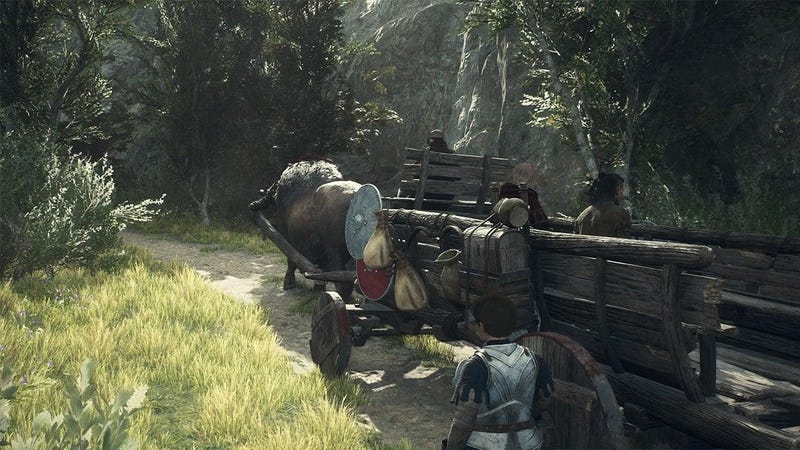
Fast-travel mechanics often serve to smooth out a player’s experience of a game’s world, making its actual terrain and the act of traversing it easier to ignore. In a more traditional open-world RPG, you’re typically required to make that trek to a city once, then gaining the ability to warp there at will in the future. As a playthrough goes on, you can just teleport at will across long distances in order to keep the action of the game moving. Even games like Breath of the Wild, Tears of the Kingdom, and Elden Ring that eschew the oft-derided Ubisoft open-world design of the past decade still allow for relatively player-friendly fast travel.
And while those critically acclaimed games don’t always shy away from player inconvenience and friction, most of that friction emerges in combat. That friction can have purpose, such as how Soulslikes use it to give the player a real sense of accomplishment after taking the time to learn enemy patterns and take down a tough boss. However in most games, combat is used as a way to fulfill a power fantasy. If you level up enough or find the best gear even the most dangerous enemies will turn into fodder before you.
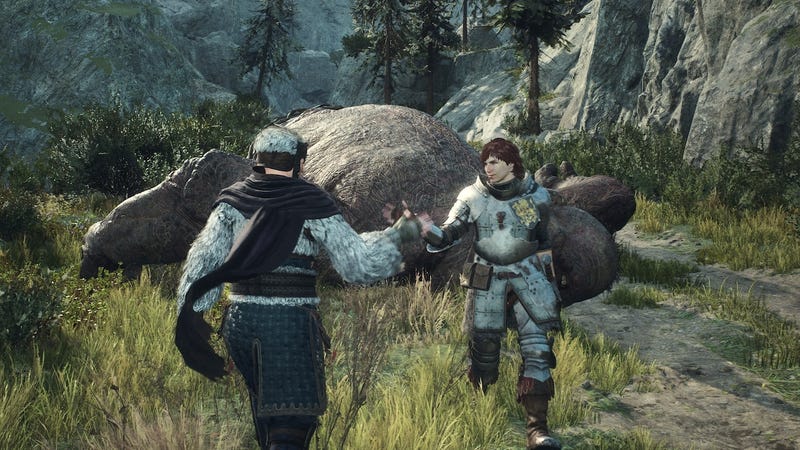
That sense of challenge, of losing to or defeating an enemy in combat, is the most common kind of friction players encounter. In opposition to that, Dragon’s Dogma 2 reserves the majority of its friction for non-combat systems such as travel. This is something you can’t level out of. Even the game’s more standard fast travel option, Ferrystones, relies on the limited resource of Port Crystals. Every player, no matter their strength, must still deal with the reality of traveling long distances.
Despite an outcry from some players on social media claiming the opposite, traveling in Dragon’s Dogma 2 is indeed fun. But it’s fun in an unexpected way that reflects the larger design ethos of the game, a n ethos centered on intentional friction. “We’ve put a lot of work into designing a game where you can stumble across someone and something will happen, so while it’s fine if it does have fast travel, we decided to design the map in a way that the journey [itself] could be enjoyed,” explained Itsuno.
The joy of cooking (and hiking)
To rely on cliche, in Dragon’s Dogma 2 is about the journey, not the destination. Traveling across the hills and valleys of the game’s world is a recipe for emergent moments of adventure to occur. You might stumble upon an NPC with an odd job for you or find yourself spending hours off the beaten path, delving deep into the caves littered across the map. All the while, you’re accompanied by the unique, expressive personalities of your pawns, the game’s NPC party members. Thanks to their companionship, the game’s emergent fun while traveling can come not just in the form of combat or quests with direct payoffs, but also in narratively emergent moments that deepen your connection with its characters.
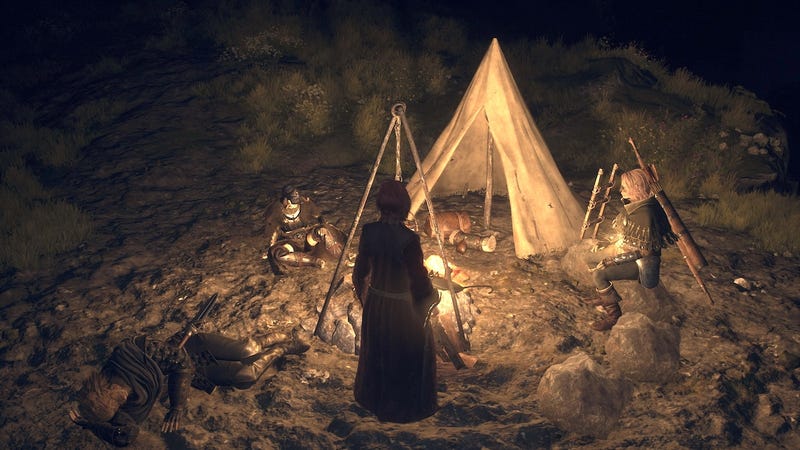
It’s why, even though you can doze off while riding an oxcart to make travel shorter, I often opt to spend time sitting and watching the scenery roll by. I want to make sure I don’t miss a potential treat in the form of literal treasure, but I also want to hear my pawns bicker and gossip about my Arisen as well as their past masters. Getting to take in the view while I do this is just an added bonus.
The game’s approach to health also encourages you to take a second to rest and spend time with your party. As you get hit in combat, your maximum health gets reduced. The only way to restore it is to rest. A quest that tasks you with crossing the map may take several in-game days as a result. And every time you rest, you’ll want to eat a good meal for helpful buffs. This requires you to search out the right monsters and cook the proper dish.
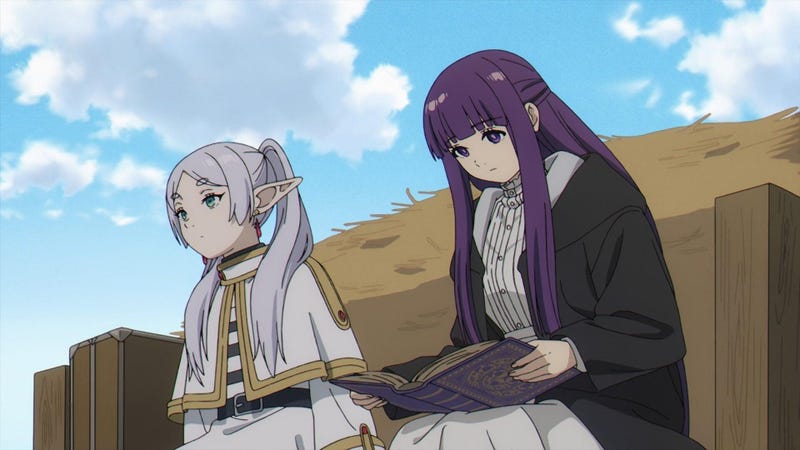
These are the mundane moments that define Dragon’s Dogma 2. Sitting in an oxcart with your pawns and cooking meals over a crackling fire. As I played the game, I couldn’t help but constantly draw parallels to two of this year’s best anime: Frieren: Beyond Journey’s End and Delicious in Dungeon. Both are traditional medieval fantasy stories centered around a party of adventurers making their way slowly through the world they inhabit in hopes of completing some end goal. Much like the Arisen’s journey in Dragon’s Dogma 2, however, the story is more about the mundanity of how these travelers get to where they are going.
Delicious in Dungeon is especially rooted in the Dungeons & Dragons mechanic of characters needing to rest and cook meals to sustain themselves on their journey. For the poor adventurers of Delicious in Dungeon, that means killing and cooking monsters in ways that make them look way more appetizing than they have any right to be. Dragon’s Dogma 2 also requires you to scavenge and hunt down your food, but players are rewarded with a luxurious video of a prime cut of meat getting cooked over a crackling fire. Like in real life, after a long day of hiking, nothing is better than a good meal.
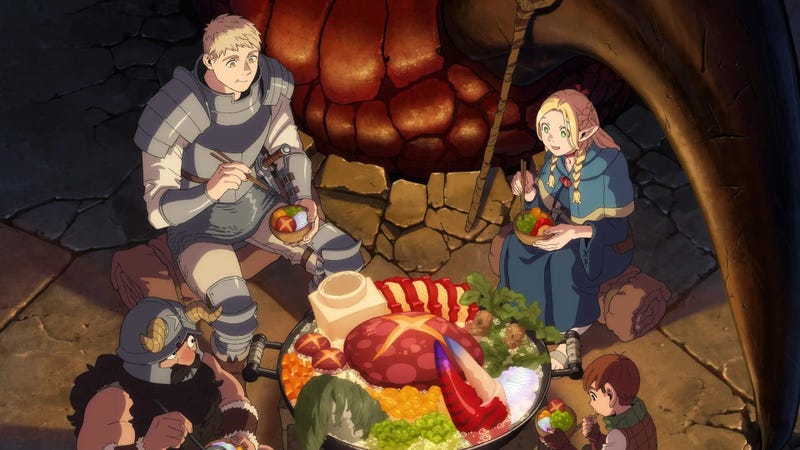
As for Frieren, so much of the anime is spent showing characters simply walking on roads or sitting in carts. They struggle against the weather, the monsters, and sometimes each other. But through that simple act of traveling together in such close proximity, when so much of time is spent doing mundane actions like cooking or walking, we see relationships blossom. The titular Frieren’s central struggle is learning how to connect with those around her. As an elf she has a lengthy lifespan, and she’s lived with a disregard for the people who have come in and out of her life in what feels like a blink of the eye. Throughout the show, Frieren works to overcome this failing by spending time on the road with a new party of companions she hopes to understand.
Being on the road is also how my Arisen grows closer to her pawns, companions that you slowly grow to love over time. I’ve repeatedly held on to a particularly special pawn despite them being underleveled compared to my hero, not wanting to let them go because of the bond we’d formed. But like Frieren in her longevity, saying goodbye is an ever-present part of life. What is important is appreciating every moment you have with someone.
A true sense of adventure
So much of traditional modern western fantasy can trace itself back to the works of J.R.R. Tolkien. Fantasy games like Dragon’s Dogma 2 and anime like Frieren and Delicious in Dungeon are inspired by Dungeons & Dragons, which itself is directly inspired by Tolkien. And while most people think first of The Lord of the Rings, I’m more interested in The Hobbit, Tolkien’s 1937 book that would later serve as a prequel for his more famous trilogy.
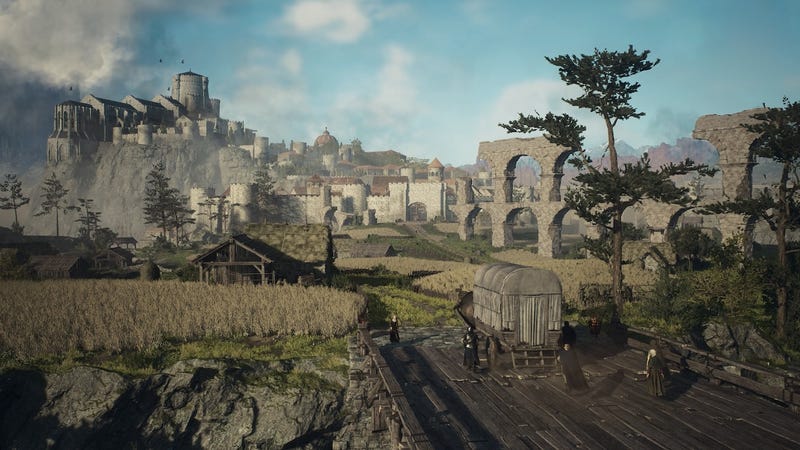
The Hobbit tells the story of Bilbo Baggins, who is taken out of his humdrum life in the idyllic Shire and sent on an adventure that takes him a total of 421 days to complete. In that time, he bonds with a party of dwarves on the way to the Lonely Mountain, returning home a changed man. The full title of the story is The Hobbit, or There and Back Again. Bilbo’s story isn’t just about reaching the climactic face-off with a dragon and various armies of the world; it’s about the ways that being exposed to new things in the world during this journey changes him. It’s why Tolkien’s reputation for detailed description of the seemingly normal parts of the world are so valuable: the world is what changes Bilbo. Coming “Back Again” is just as important as going “There.”
The seemingly friction-filled mentality of Dragon’s Dogma 2 forces you to engage with the living, breathing world your character and their companions exist within. Just as you’re a force of change on the world, the world is a force of change on you. While that happens in the exciting moments of dealing a killing blow to a hulking monster, it also happens in the quiet conversations with your party. It’s a narrative structure of hills and valleys that reflect the hills and valleys you travel over, and in those hills and valleys, entire journeys play out. For Dragon’s Dogma 2, “There” and “Back Again” are valued in equal measure.
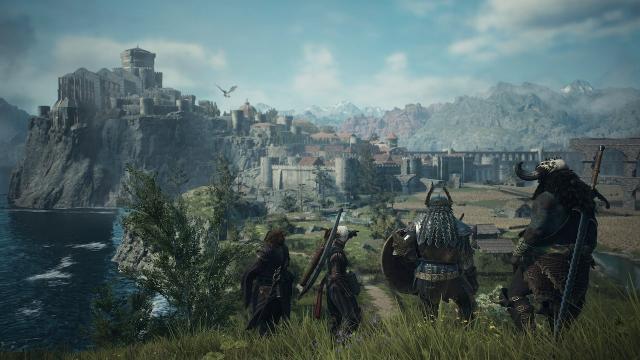
Leave a Reply